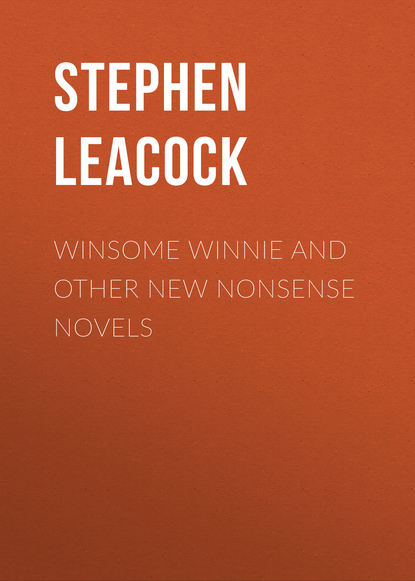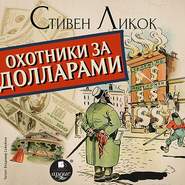По всем вопросам обращайтесь на: info@litportal.ru
(©) 2003-2024.
✖
Winsome Winnie and other New Nonsense Novels
Автор
Год написания книги
2019
Настройки чтения
Размер шрифта
Высота строк
Поля
"What's the matter with it?" questioned Lee eagerly. "I felt there was something wrong myself. What is it?"
"Your left," said Randolph, "is too far advanced. It sticks out."
"By Heaven!" said Lee, turning to General Longstreet, "the boy is right! Is there anything else?"
"Yes," said Randolph, "your right is crooked. It is all sideways."
"It is. It is!" said Lee, striking his forehead. "I never noticed it. I'll have it straightened at once. Major Randolph, if the Confederate cause is saved, you, and you alone, have saved it."
"One thing more," said Randolph. "Is your artillery loaded?"
"Major Randolph," said Lee, speaking very gravely, "you have saved us again. I never thought of it."
At this moment a bullet sang past Eggleston's ear. He smiled.
"The battle has begun," he murmured. Another bullet buzzed past his other ear. He laughed softly to himself. A shell burst close to his feet. He broke into uncontrolled laughter. This kind of thing always amused him. Then, turning grave in a moment, "Put General Lee under cover," he said to those about him, "spread something over him."
In a few moments the battle was raging in all directions. The Confederate Army was nominally controlled by General Lee, but in reality by our hero. Eggleston was everywhere. Horses were shot under him. Mules were shot around him and behind him. Shells exploded all over him; but with undaunted courage he continued to wave his sword in all directions, riding wherever the fight was hottest.
The battle raged for three days.
On the third day of the conflict, Randolph, his coat shot to rags, his hat pierced, his trousers practically useless, still stood at Lee's side, urging and encouraging him.
Mounted on his charger, he flew to and fro in all parts of the field, moving the artillery, leading the cavalry, animating and directing the infantry. In fact, he was the whole battle.
But his efforts were in vain.
He turned sadly to General Lee. "It is bootless," he said.
"What is?" asked Lee.
"The army," said Randolph. "We must withdraw it."
"Major Randolph," said the Confederate chief, "I yield to your superior knowledge. We must retreat."
A few hours later the Confederate forces, checked but not beaten, were retiring southward towards Virginia.
Eggleston, his head sunk in thought, rode in the rear.
As he thus slowly neared a farmhouse, a woman—a girl—flew from it towards him with outstretched arms.
"Eggleston!" she cried.
Randolph flung himself from his horse. "Leonora!" he gasped. "You here! In all this danger! How comes it? What brings you here?"
"We live here," she said. "This is Pa's house. This is our farm. Gettysburg is our home. Oh, Egg, it has been dreadful, the noise of the battle! We couldn't sleep for it. Pa's all upset about it. But come in. Do come in. Dinner's nearly ready."
Eggleston gazed a moment at the retreating army. Duty and affection struggled in his heart.
"I will," he said.
CHAPTER V
CONCLUSION
The strife is done. The conflict has ceased. The wounds are healed. North and South are one. East and West are even less. The Civil War is over. Lee is dead. Grant is buried in New York. The Union Pacific runs from Omaha to San Francisco. There is total prohibition in the United States. The output of dressed beef last year broke all records.
And Eggleston Lee Carey Randolph survives, hale and hearty, bright and cheery, free and easy—and so forth. There is grey hair upon his temples (some, not much), and his step has lost something of its elasticity (not a great deal), and his form is somewhat bowed (though not really crooked).
But he still lives there in the farmstead at Gettysburg, and Leonora, now, like himself, an old woman, is still at his side.
You may see him any day. In fact, he is the old man who shows you over the battlefield for fifty cents and explains how he himself fought and won the great battle.
VIII
BUGGAM GRANGE A GOOD OLD GHOST STORY
The evening was already falling as the vehicle in which I was contained entered upon the long and gloomy avenue that leads to Buggam Grange.
A resounding shriek echoed through the wood as I entered the avenue. I paid no attention to it at the moment, judging it to be merely one of those resounding shrieks which one might expect to hear in such a place at such a time. As my drive continued, however I found myself wondering in spite of myself why such a shriek should have been uttered at the very moment of my approach.
I am not by temperament in any degree a nervous man, and yet there was much in my surroundings to justify a certain feeling of apprehension. The Grange is situated in the loneliest part of England, the marsh country of the fens to which civilization has still hardly penetrated. The inhabitants, of whom there are only one and a half to the square mile, live here and there among the fens and eke out a miserable existence by frog-fishing and catching flies. They speak a dialect so broken as to be practically unintelligible, while the perpetual rain which falls upon them renders speech itself almost superfluous.
Here and there where the ground rises slightly above the level of the fens there are dense woods tangled with parasitic creepers and filled with owls. Bats fly from wood to wood. The air on the lower ground is charged with the poisonous gases which exude from the marsh, while in the woods it is heavy with the dank odours of deadly nightshade and poison ivy.
It had been raining in the afternoon, and as I drove up the avenue the mournful dripping of the rain from the dark trees accentuated the cheerlessness of the gloom. The vehicle in which I rode was a fly on three wheels, the fourth having apparently been broken and taken off, causing the fly to sag on one side and drag on its axle over the muddy ground, the fly thus moving only at a foot's pace in a way calculated to enhance the dreariness of the occasion. The driver on the box in front of me was so thickly muffled up as to be indistinguishable, while the horse which drew us was so thickly coated with mist as to be practically invisible. Seldom, I may say, have I had a drive of so mournful a character.
The avenue presently opened out upon a lawn with overgrown shrubberies, and in the half darkness I could see the outline of the Grange itself, a rambling, dilapidated building. A dim light struggled through the casement of a window in a tower room. Save for the melancholy cry of a row of owls sitting on the roof, and croaking of the frogs in the moat which ran around the grounds, the place was soundless. My driver halted his horse at the hither side of the moat. I tried in vain to urge him, by signs, to go further. I could see by the fellow's face that he was in a paroxysm of fear, and indeed nothing but the extra sixpence which I had added to his fare would have made him undertake the drive up the avenue. I had no sooner alighted than he wheeled his cab about and made off.
Laughing heartily at the fellow's trepidation (I have a way of laughing heartily in the dark), I made my way to the door and pulled the bell-handle. I could hear the muffled reverberations of the bell far within the building. Then all was silent. I bent my ear to listen, but could hear nothing except, perhaps, the sound of a low moaning as of a person in pain or in great mental distress. Convinced, however, from what my friend Sir Jeremy Buggam had told me, that the Grange was not empty, I raised the ponderous knocker and beat with it loudly against the door.
But perhaps at this point I may do well to explain to my readers (before they are too frightened to listen to me) how I came to be beating on the door of Buggam Grange at nightfall on a gloomy November evening.
A year before I had been sitting with Sir Jeremy Buggam, the present baronet, on the verandah of his ranch in California.
"So you don't believe in the supernatural?" he was saying.
"Not in the slightest," I answered, lighting a cigar as I spoke. When I want to speak very positively, I generally light a cigar as I speak.
"Well, at any rate, Digby," said Sir Jeremy, "Buggam Grange is haunted. If you want to be assured of it go down there any time and spend the night and you'll see for yourself."
"My dear fellow," I replied, "nothing will give me greater pleasure. I shall be back in England in six weeks, and I shall be delighted to put your ideas to the test. Now tell me," I added somewhat cynically, "is there any particular season or day when your Grange is supposed to be specially terrible?"
Sir Jeremy looked at me strangely. "Why do you ask that?" he said. "Have you heard the story of the Grange?"
"Never heard of the place in my life," I answered cheerily. "Till you mentioned it to-night, my dear fellow, I hadn't the remotest idea that you still owned property in England."
"The Grange is shut up," said Sir Jeremy, "and has been for twenty years. But I keep a man there—Horrod—he was butler in my father's time and before. If you care to go, I'll write him that you're coming. And, since you are taking your own fate in your hands, the fifteenth of November is the day."














